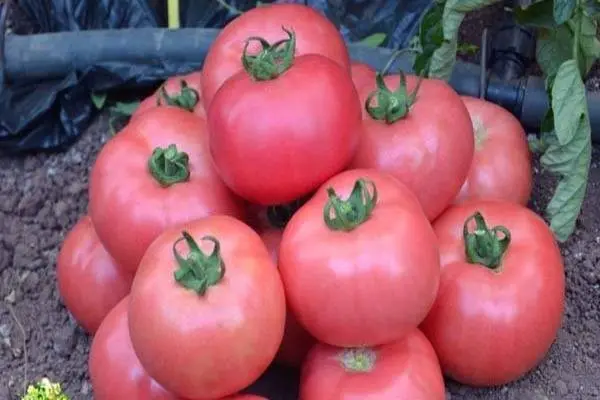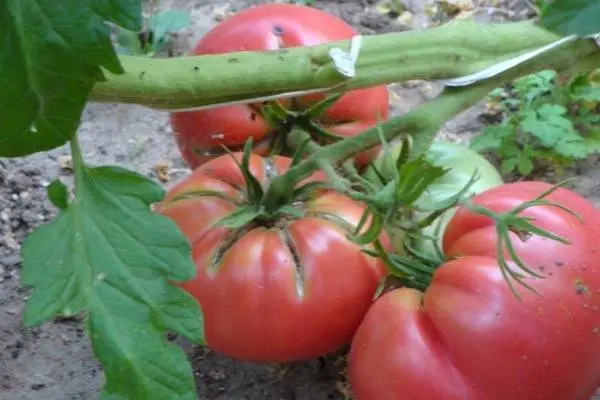Contents
For lovers of a stable harvest of tomatoes, the Tretyakov F1 variety is perfect. This tomato can be grown both outdoors and in a greenhouse. A distinctive feature of the variety is its high yield even under adverse environmental conditions.
Variety description
Tretyakovsky belongs to the hybrid forms of tomatoes and has a medium early ripening period. Due to the medium foliage, the bushes have a compact shape. Tomatoes ripen with a mass of 110-130 gr., About eight fruits can be tied in a brush. Tomatoes stand out with a rich raspberry color, at the break the pulp has a sugary juicy structure (as in the photo). According to summer residents, the Tretyakov F1 tomato has excellent taste characteristics. Tomatoes keep well for a long time and are well transported.

Advantages of tomato Tretyakov F1:
- high resistance to diseases (tobacco mosaic virus, fusarium, cladosporiosis);
- excellent yield;
- variety Tretyakovsky F1 tolerates temperature extremes and lack of moisture;
- fruits can be used both fresh and canned.
The disadvantage of the Tretyakov F1 tomato is the difficulty in finding truly high-quality seeds, the need for regular tying of branches with fruits.
From a square meter of area, you can collect 12-14 kg of fruit. Variety Tretyakovsky F1 is shade-tolerant and gives an excellent harvest even under adverse conditions. The first harvest ripens 100-110 days after the seed germination.
Growing seedlings
The most favorable way to grow tomato variety Tretyakovsky F1 is a greenhouse. Therefore, to obtain an earlier harvest, it is recommended to plant seedlings.
Stages of sowing grains:
- Soil mixture is being prepared for seeds. When self-harvesting the land, it is desirable to disinfect it first. To do this, the soil is calcined in the oven. To get a fertile mixture, take garden soil, compost and sand in equal parts. The best option is a ready-made store-bought soil mixture.
- Typically, hybrid tomato seed producers inform buyers about seed treatment. Therefore, it is allowed to plant grains Tretyakov F1 dry. If you want to be safe, you can soak the seeds in warm water, put them in a wet napkin until they germinate (the material is placed in a warm place). The material must not be allowed to dry, so it is necessary to moisten the fabric periodically.
- Grooves 0,5-1 cm deep are made on the surface of the moistened soil, in which germinated seeds are placed at a distance of about 2 cm from each other. Seeds of the Tretyakovsky F1 variety are sprinkled with soil and slightly compacted. The box with planting material is covered with a film or glass and placed in a warm place (+ 22 … + 25˚ C).
- After about 5-7 days, the seeds germinate. You can remove the covering material and put the containers with seedlings in a bright place.
As soon as two leaves grow on the seedlings, you can plant the sprouts in separate cups. At this stage of growth, the Tretyakov F1 seedlings are watered once a week. When more than five leaves appear on the stems, watering is carried out twice a week.
The use of illumination is an important condition for growing strong seedlings of the Tretyakovsky F1 variety. For these purposes, a phytolamp is installed near the container. The first time fertilizers are applied to the soil one and a half weeks after transplanting the seedlings. To feed the seedlings, it is watered once a week with a solution of biohumus (2 tablespoons of fertilizer are added per liter of water).
10 days before planting the sprouts in the greenhouse, they begin to harden them – take them out into the street. The time spent in the open air is increased gradually.
Caring for tomatoes in a greenhouse
It is possible to plant seedlings of Tretyakov F1 tomatoes in late April or early May, which is determined by the climatic characteristics of the region. The soil temperature should not be lower than + 14˚ C, otherwise the root system of seedlings may rot.
Greenhouse preparation:
- in film constructions, the coating is changed;
- disinfect the greenhouse;
- prepare the soil – dig up the ground and arrange the beds;
The indeterminate variety Tretyakovsky F1 is planted at a distance of 65-70 cm from each other. There should not be more than four tomatoes per square meter of land. To form a bush, two or three stems are left. Particular attention is paid to the garter of the Tretyakov F1 tomato, otherwise the branches may simply break off during the fruit ripening period. To prevent the growth of the bush, pinching is constantly carried out.

Top dressing and watering tomatoes in the greenhouse
Foliar top dressing of Tretyakov F1 tomatoes is not practiced, since the humid environment of the greenhouse can cause the onset and rapid spread of infections. The preparation of a solution for fertilizing the soil is carried out per 10 liters of water:
- the first time dissolve 20 g of ammonium nitrate, 50 g of double superphosphate and 10 g of potassium chloride. Fertilize one to two weeks after transplanting sprouts;
- as soon as ovaries form on the bushes, add a solution of 80 g of double superphosphate and 30 g of potassium nitrate;
- the third time during the ripening period of the crop, a solution of 40 g of double superphosphate and 40 g of potassium nitrate is added.
Watering rules
Young seedlings are watered moderately, as the soil dries. During the ripening period of tomatoes Tretyakovskiy F1 there should not be a lack of moisture, so watering is required infrequently, but plentifully. It is desirable to engage in the procedure during the day, then the water will be warm enough and before the evening temperature drops, you can have time to ventilate the greenhouse well.
The best option for watering tomatoes of the Tretyakovskiy F1 variety is the equipment of a drip system. At the same time, the structure of the upper soil layer is preserved, there is no sharp drop in soil moisture, and a minimum of effort is expended on the process.
Diseases and pests
The Tretyakovsky F1 variety is distinguished by high immunity, therefore it practically does not suffer from fungal diseases. However, attention should be paid to the prevention of late blight and pest control.
Late blight is a fungal disease that affects the leaves of individual bushes and spreads rapidly. Greens and fruits are covered with brown and brown spots. If each bush is not carefully processed, then in just a few days all plants can die. A favorable environment for the spread of the disease is humidity and low temperature. The main measure to combat the fungus is prevention. As soon as cold rainy weather sets in, the tomatoes are sprayed with special preparations (Fitosporin, Ecosil, Bordeaux liquid). If the first affected leaves are found, they must be plucked and burned. Tomatoes should be removed green, thoroughly washed and disinfected (just hold for 2-3 minutes in water at a temperature of + 55 … + 60˚ C).
Scoop is a small butterfly whose caterpillars can harm a tomato Tretyakov F1. Pests destroy not only foliage, but also green or ripe fruits. The insect winters well at a depth of about 25 cm. To combat the pest, pollination of tomato bushes, careful removal of weeds, and digging of the soil in late autumn are used.
In the southern regions, Colorado potato beetles can attack plantings of the Tretyakovskiy F1 tomato variety (especially if there are potato beds nearby).
Thanks to minimal effort, you can get rich yields of tomato varieties Tretyakovskiy F1. Even novice summer residents will cope with caring for a tomato – it is important to prevent branches with ripe fruits from breaking off.









